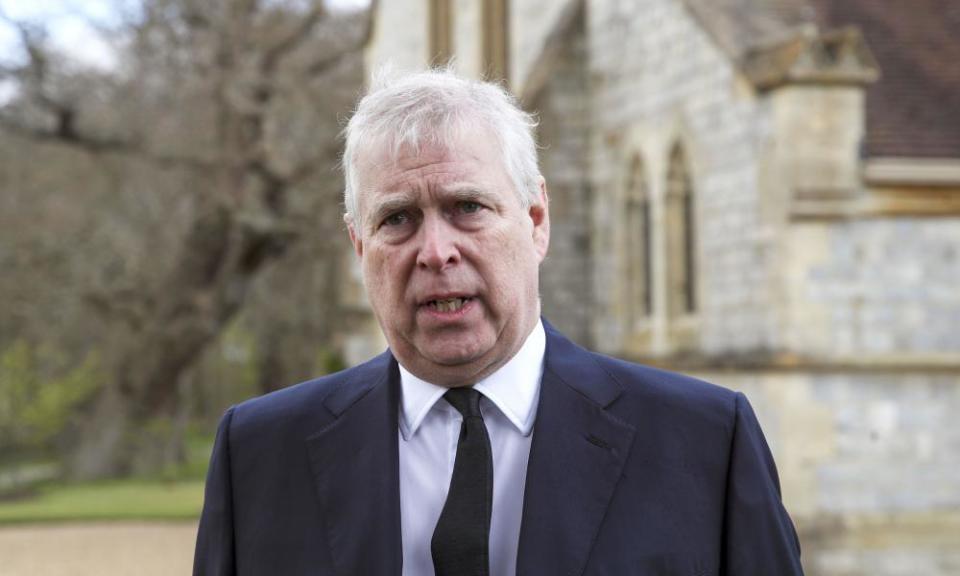Key points from Prince Andrew’s response to Virginia Giuffre’s lawsuit

What the royal’s lawyers said in his answer and defences to the sexual abuse suit against him
Prince Andrew has filed his answer and defences to Virginia Giuffre’s sexual abuse lawsuit against him, brought in the New York district court. Here are some of the key points from the court papers. The prince’s lawyers say:
Prince Andrew denies the allegations contained in paragraph one of the complaint. (Paragraph one of the complaint: “This suit arises out of defendant’s sexual abuse of plaintiff when she was under the age of 18 years old.”)
Prince Andrew lacks sufficient information to admit or deny the allegations contained in paragraph two of the complaint. (Paragraph two: “During 2000–2002, beginning when plaintiff was 16, plaintiff was the victim of sex trafficking and abuse by convicted sex offender Jeffrey Epstein.”)
Prince Andrew denies the first clause in paragraph seven of the complaint. He lacks sufficient information to admit or deny the remaining allegations contained in that paragraph. (Paragraph seven: “Prince Andrew was a close friend of Ghislaine Maxwell, a British socialite who spent years overseeing and managing Epstein’s sex trafficking network, and actively recruited underage girls, including plaintiff.”)
Prince Andrew denies the allegations contained in paragraph nine of the complaint. (Paragraph nine: “After publicly feigning ignorance about the scope of Epstein’s sex-trafficking operation and sympathy for Epstein’s victims, Prince Andrew has refused to cooperate with US authorities in their investigation and prosecution of Epstein and his co-conspirators.”)
Prince Andrew admits that he met Epstein in or around 1999. He denies the remaining allegations in the first sentence of paragraph 30 of the complaint, and lacks sufficient information to admit or deny the allegations contained in the second sentence of that paragraph. (Paragraph 30: “According to Prince Andrew, he first met Epstein in 1999 through Maxwell, Prince Andrew’s close friend. Prince Andrew and Maxwell have been photographed at numerous social events together.”)
Prince Andrew lacks sufficient information to admit or deny the allegations contained in paragraph 33 of the complaint. (Paragraph 33: “In 2006, Prince Andrew invited Epstein to his daughter’s 18th birthday party, despite Epstein being charged with procuring a minor for prostitution only one month prior.”)
Prince Andrew lacks sufficient information to admit or deny the allegations contained in paragraph 38 of the complaint. (Paragraph 38: “The below photograph depicts Prince Andrew, plaintiff, and Maxwell at Maxwell’s home prior to Prince Andrew sexually abusing plaintiff.”)
[Virginia] Giuffre’s complaint should be dismissed because this court lacks subject matter jurisdiction over the action.
Giuffre, through her own actions, inactions, and other conduct – including, without limitation, entering into the 2009 release agreement with Epstein containing a broad third-party release of her claims against Prince Andrew and others – waived the claims now asserted in the complaint.
Assuming, without admitting, that Giuffre has suffered any injury or damage, Giuffre and/or others, who are not Prince Andrew, contributed in whole or in part to the alleged damage.
Assuming, without admitting, that Giuffre has suffered any injury or damage alleged in the complaint, Giuffre’s claims are barred by the doctrine of consent.
Giuffre’s alleged causes of action are barred in whole or in part by her own wrongful conduct and the doctrine of unclean hands.
Giuffre’s claims are barred in whole or in part by the applicable statute(s) of limitations.

 Yahoo Movies
Yahoo Movies 